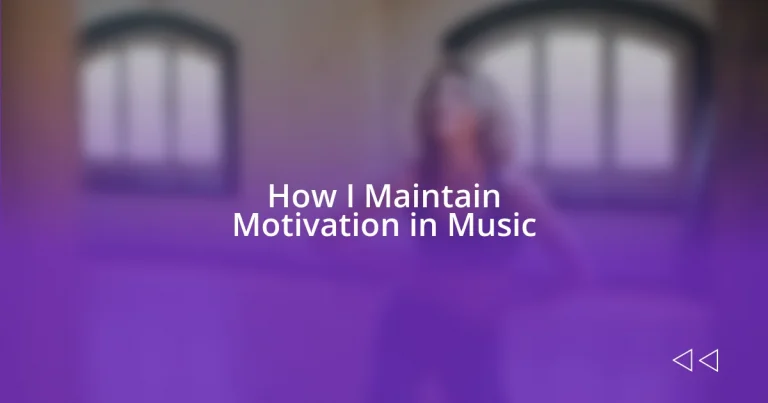Key takeaways:
- Setting clear, achievable goals and breaking them into smaller tasks enhances motivation and allows for celebrating progress.
- Creating a structured daily practice routine, incorporating warm-ups, variety, and reflection, fosters consistent growth and enjoyment in music.
- Building connections with fellow musicians and using positive reinforcement methods cultivates accountability and reinforces a love for music.
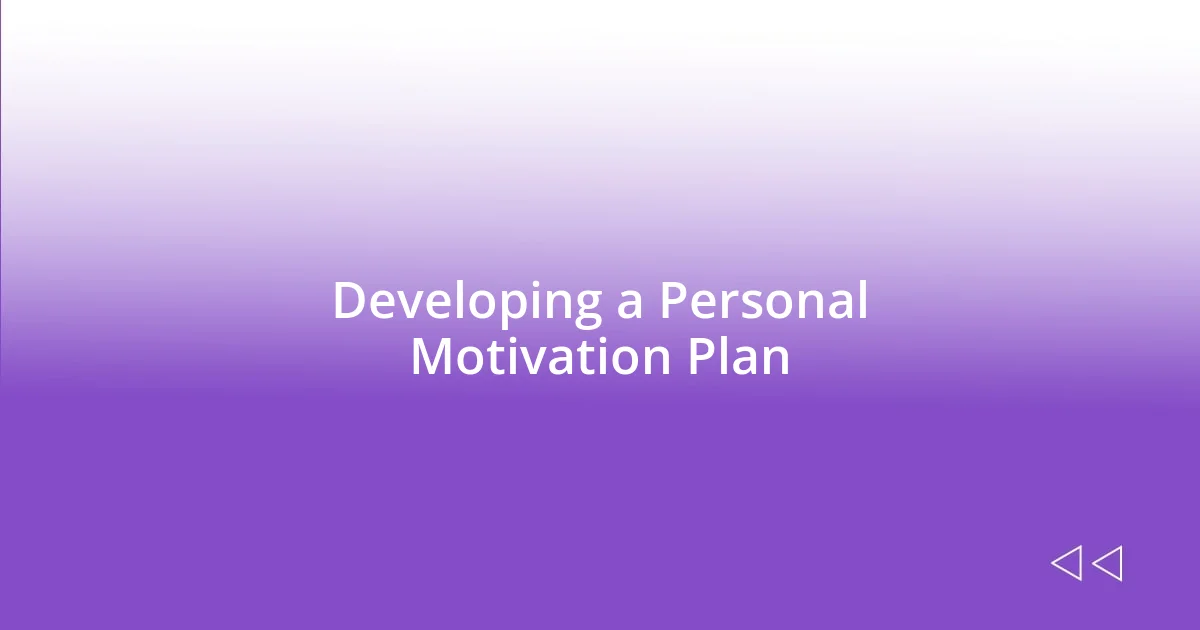
Developing a Personal Motivation Plan
When I first started thinking about my personal motivation plan, I realized how important it was to set clear, achievable goals. For instance, I once dreamed of mastering a complicated piece but felt overwhelmed. Breaking it down into smaller sections made it seem less daunting and more manageable, allowing me to celebrate small victories along the way.
I believe reflecting on what truly inspires me musically is crucial in developing this plan. I often ask myself, “What moments in music make my heart race?” There was a time when I attended a live concert that left me completely energized—those memories serve as a reminder of why I love music. Incorporating those feelings into my motivation plan can be incredibly powerful.
In my journey, I’ve discovered that accountability plays a significant role in staying motivated. Sharing my goals with friends or fellow musicians creates a support system. One time, I joined a local jam session, and just knowing that others were counting on me pushed me to practice more diligently. What external or internal motivators have you found effective in your own pursuits?
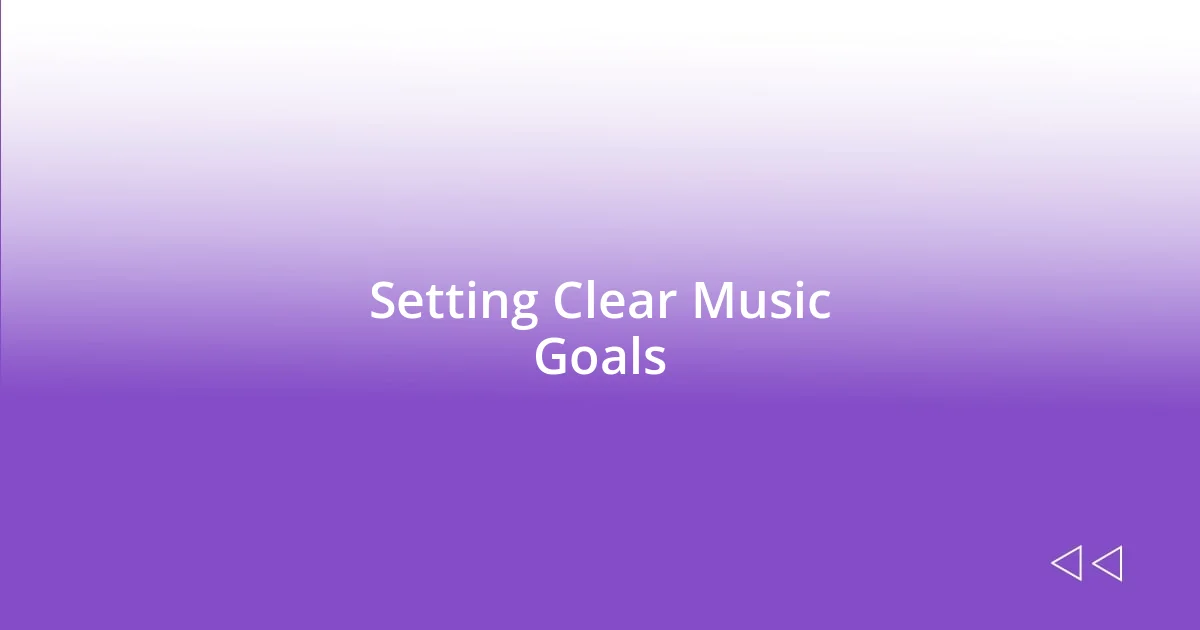
Setting Clear Music Goals
Setting clear music goals is essential to my motivation process. I’ve often found myself drafting short-term and long-term goals. For example, I once set a goal to learn a new song within a month. By breaking it down into weekly practice goals, I kept my motivation alive by tracking my progress and celebrating each small achievement along the way.
The specificity of goals can’t be overstated. Instead of just saying, “I want to be a better guitarist,” I articulate it as, “I want to master the solo from ‘Sweet Child O’ Mine’ by the end of next month.” This clear target helps me stay focused and makes my practice sessions feel purposeful. One evening, as I worked through the solo repeatedly, feeling the notes guide my fingers, I found joy not just in the outcome but in the journey itself.
Regularly revisiting and adjusting my goals is another tactic I use. Life can throw unexpected challenges my way, and sometimes my initial goals don’t align with my current circumstances. A couple of months ago, I had to put aside playing due to personal issues. When I returned, rather than forcing myself back into high-pressure goals, I opted for simple daily practices. This way, I kept the love for music alive while easing back into a routine. How have your music goals evolved over time?
| Short-Term Goals | Long-Term Goals |
|---|---|
| Focused on immediate skills | Broader vision for musical journey |
| Examples: Learn a new song | Examples: Start a band or compose an album |
| Regular review and adjust | Set milestones along the way |
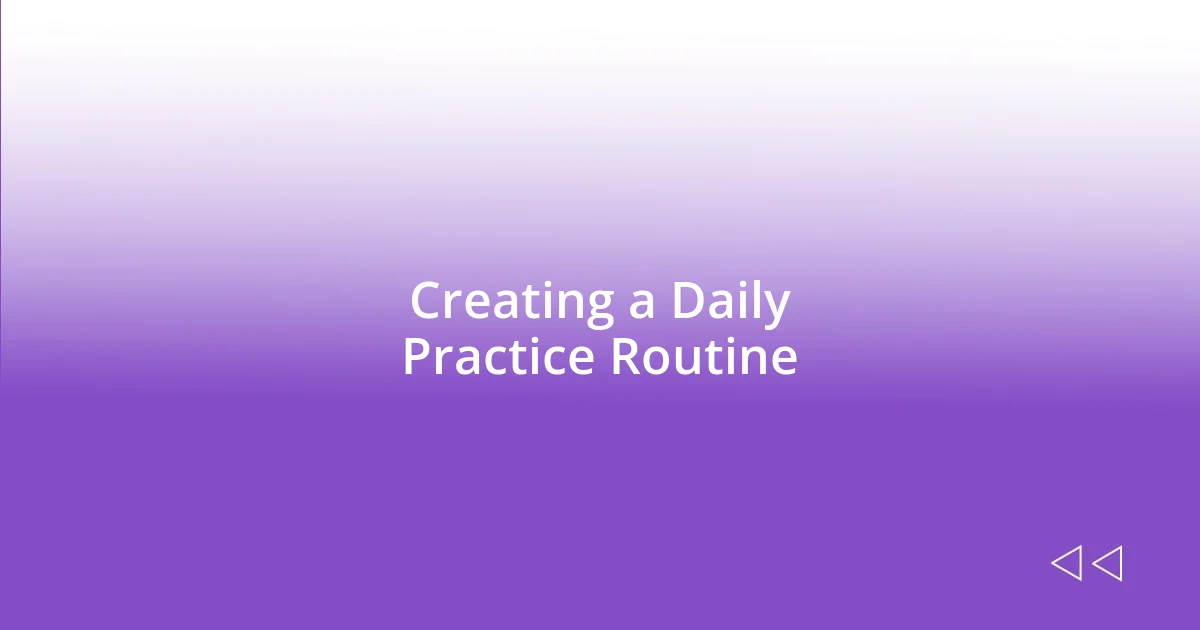
Creating a Daily Practice Routine
Creating a daily practice routine is something I’ve refined over the years, and it has truly transformed my musical journey. I often think of my routine as both a discipline and a sanctuary. For example, when I started dedicating just 20 minutes a day to scales, I was astonished by how quickly my finger agility improved. It felt rewarding to see tangible progress, which fueled my desire to practice more consistently.
Here are some key elements that I integrate into my daily routine to maintain motivation:
- Set a specific time: I find it helpful to practice at the same time each day, almost like an appointment with myself.
- Create a warm-up routine: Starting with scales or simple exercises helps me ease into practice and get into the right mindset.
- Mix it up: I like to alternate between different pieces and genres, keeping each session fresh and engaging.
- Reflect on progress: At the end of each week, I jot down what I’ve learned or improved to remind myself of my growth.
- Include downtime: I also schedule breaks during longer sessions; letting my mind rest often leads to breakthroughs.
By applying these strategies, my practice time not only becomes productive but also deeply fulfilling, creating a space where I connect with music in a more profound way.
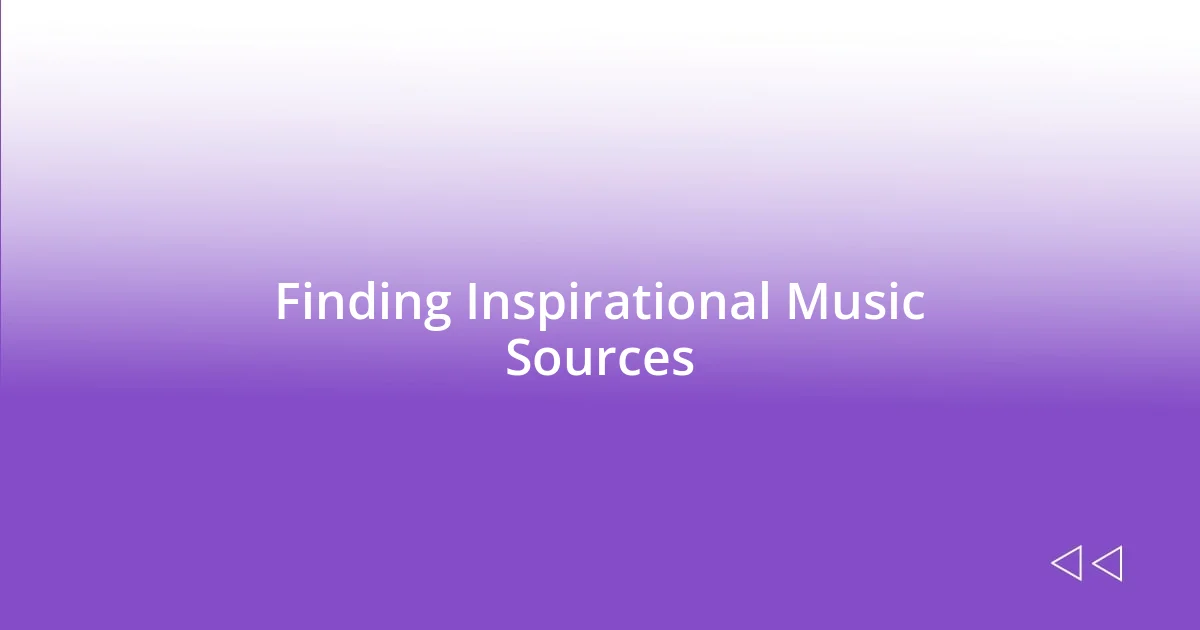
Finding Inspirational Music Sources
Finding the right sources of inspiration in music can be a game-changer for maintaining motivation. Personally, I love diving deep into different genres and artists, which opens up a world of creativity. One day, while exploring a lesser-known jazz artist, I stumbled upon a haunting melody that sparked an idea for my own composition. Have you ever felt that rush of inspiration from a single note or chord?
Collaborating with other musicians is another source of endless inspiration for me. Sharing ideas and hearing fresh perspectives can turn a mundane practice session into an exciting jam. I recall a time when a fellow guitarist introduced me to an unconventional chord progression. This not only challenged me but also reignited my passion for experimenting with my sound. How often do you step out of your comfort zone musically?
Finally, I believe live performances can be incredibly motivating. There’s something electric about being in a crowd, surrounded by people who share the love of music. I still remember the exhilaration I felt at a local open mic night, watching different artists bare their souls on stage. The emotions in those performances serve as a powerful reminder of why I fell in love with music in the first place. What experiences have you had that reignited that spark in you?
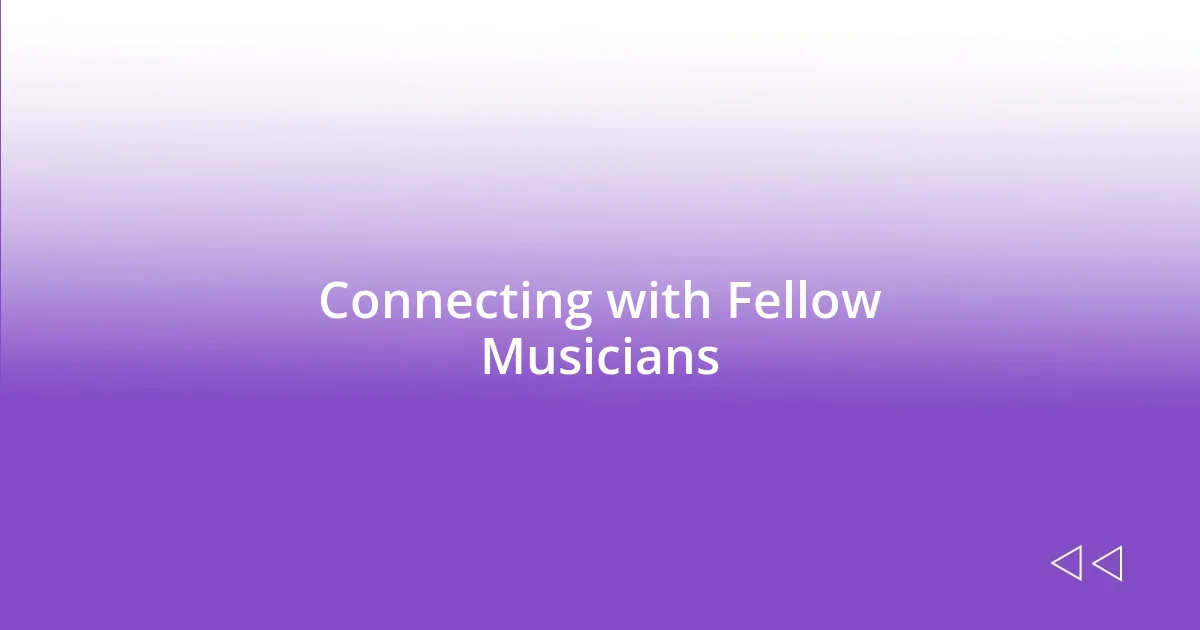
Connecting with Fellow Musicians
Connecting with fellow musicians is one of the most enriching experiences I cherish in my musical journey. I remember attending a local jam session where I met a diverse group of musicians. It was electrifying to collaborate on a song we had all just learned and see how each person’s style added a unique flavor. Have you ever felt that thrill when blending your sound with someone else’s?
Building relationships with other musicians has also opened doors to new opportunities. I once teamed up with a drummer I met through an online forum. It was incredible how we exchanged not just ideas, but stories behind our musical choices. I found that discussing our creative processes brought a sense of camaraderie, and it pushed me to experiment with rhythmic elements that had previously intimidated me. Isn’t it fascinating how another person’s insight can reshape your own?
Moreover, engaging with fellow musicians fosters an environment of accountability. I often participate in group challenges, like writing a new song within a week. Knowing that others are working alongside me creates a motivating atmosphere where I feel compelled to show up for myself and my collaborators. Have you tried setting musical goals with friends? The sense of shared purpose can make a world of difference.
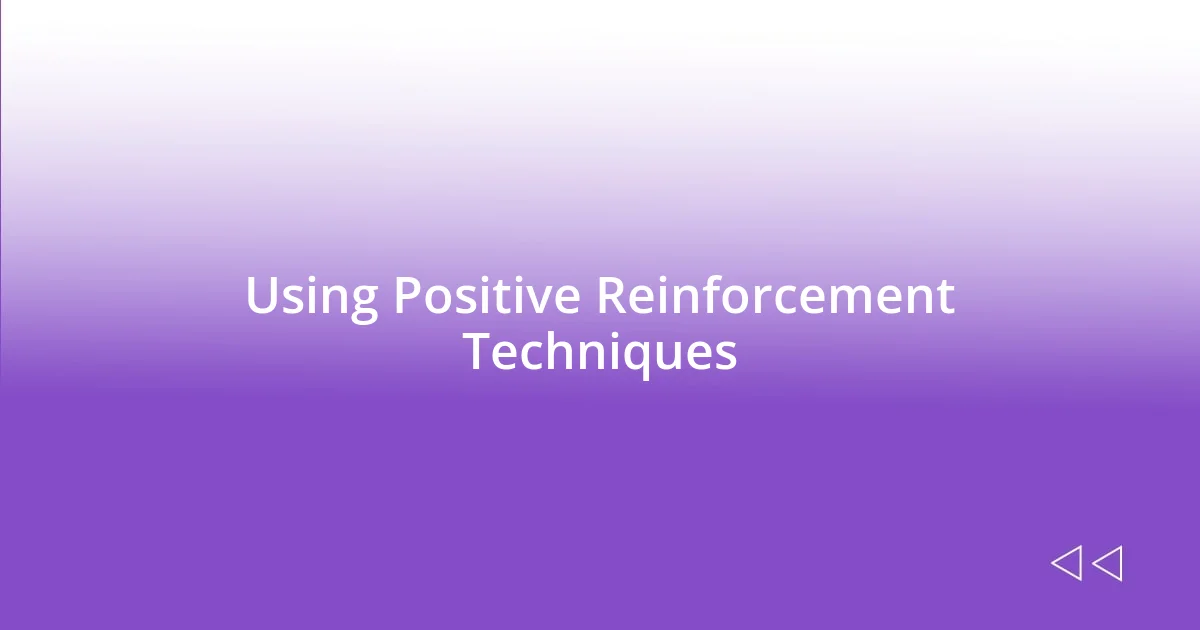
Using Positive Reinforcement Techniques
Using positive reinforcement techniques can dramatically boost motivation in music, an approach I’ve found especially effective. Whenever I achieve a personal milestone, like nailing a challenging piece, I reward myself with something I enjoy, whether it’s a favorite snack or a night out with friends. This little celebration reinforces the idea that dedication pays off, making me excited to reach the next level. Have you ever rewarded yourself for your accomplishments in music?
Celebrating small victories has become a cornerstone of my practice. For example, after completing a week of consistent practice, I treat myself to a special weekend music jam with friends. It’s not just about the reward; it’s about the joy that follows my hard work. I notice that it significantly uplifts my spirits and renews my commitment to keep improving. How do you acknowledge your progress in your musical journey?
Incorporating positive self-talk is another technique I swear by. Instead of dwelling on mistakes, I remind myself of past successes and the effort I put into my craft. This shift from self-criticism to self-encouragement fuels my passion, making practice more enjoyable and less of a chore. I often ask myself: What’s one thing I did well today that I can build on tomorrow? This question keeps me focused on growth rather than perfection.
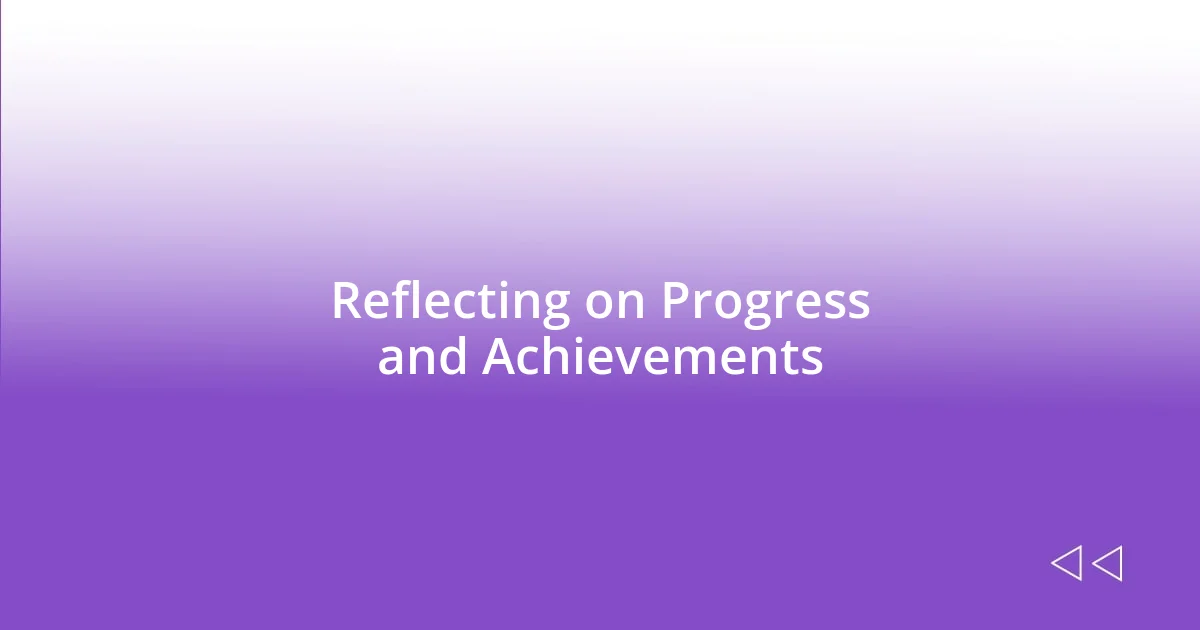
Reflecting on Progress and Achievements
Reflecting on my progress and achievements in music often feels like revisiting an old photo album—each milestone brings back memories and emotions tied to my growth. I remember the first time I played a song in front of an audience; my hands trembled, yet the applause felt like a warm hug, affirming my love for music. How often do you take a moment to cherish those small wins that propel you forward?
As I look back, I find it essential to track my development, whether it’s through journaling or recording my sessions. Just last month, I listened to an old recording and was amazed by how much my playing has improved since then. Those moments of realization invigorate my motivation and remind me that progress isn’t always linear. Have you ever experienced that empowering feeling when you realize how far you’ve come?
I also believe that celebrating achievements, no matter how small, reinforces my commitment to my craft. For instance, last week, I completed my goal of practicing for 30 consecutive days. To celebrate, I treated myself to a new music book that I had been eyeing. This act didn’t just feel like a reward; it reminded me that every effort, no matter how consistent or mundane, contributes to a larger journey in music. Isn’t it remarkable how acknowledging our progress can reignite our passion?












